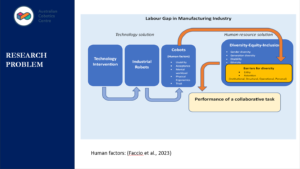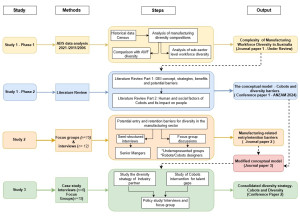Cobots Intervention for a diverse Australian manufacturing workforce
Start: February 2023
Expected end date: August 2026
Overview
As new technologies are introduced, workers must re-train, upskill and adapt as production processes and specific jobs are re-designed. Opportunities exist to diversify the workforce, retain ageing or injured workers, and create a new employee-value proposition.
With the aim of expanding the available pool of talent and addressing attraction issues, this Project will look at the implementation of collaborative robotic technology across all Partner Organisations with manufacturing operations. It will explore the potential for new technologies such as cobots to provide jobs that might be attractive to younger applicants and previously under-represented groups of workers in manufacturing (women).
Further, the study will consider how such technology might address retention and knowledge management issues by enabling injured or ageing workers to remain in meaningful and secure employment.
This study will review existing knowledge on equity, diversity, and inclusion (EDI) (concepts, categories, benefits, and potential obstacles) and explore the significance of Cobots as a potential solution for employee diversity.

Research
This project has three main studies:
Study 1: In-Depth Sector Analysis (completed in 2023) -This study analyses Australian census data from 2006 to 2021 for a comparative analysis of workforce trends in gender, generation, ethnicity, disability, and educational qualifications in Australian manufacturing and its sub-sectors. The results reveal notable variations in workforce diversity between different manufacturing sub-sectors, indicating the need for targeted efforts to promote inclusivity. Journal paper under review
Study 2: Focus Groups and Interviews (completed in 2024/2025)- The primary objective of this study is to identify the manufacturing-specific barriers faced by underrepresented groups, considering the perspectives of both managers and the groups themselves. Additionally, we aim to understand designers’ views on end-user diversity. To accomplish this, we conducted two focus groups with cobot designers, three focus groups with women and workers from different generations, and 17 interviews with managers.
Study 3: Case Study with InfraBuild (to commence in 2025) – The plan extends from 1st November 2025 to 15th November 2025 and encompasses two sites in Sydney and Melbourne. In-depth interviews and workshops will be the primary methods of data collection.
Outcomes
Upon completing this research, we expect to develop:
- a framework for manufacturing managers that combines diversity barriers and technology enablers to attract women and younger generations while ensuring a safer workplace for the older workforce.
Supervisory Team
- Principal Supervisor: Associate Professor Penny Williams, QUT
- Associate Supervisor: Professor Greg Hearn and Dr Melinda Laundon, both QUT
Publications
First Author
- Hettiarachchi, A. Potential of Cobots intervention on Australian manufacturing workforce diversity: A conceptual paper, Australian and New Zealand Academy of Management (ANZAM) 2024 Conference, University of Woolongong 2 December 2024
Presentations
- QUT Gender Equity & Inclusion Symposium. Keeping Equity on the Agenda: What’s working to advance gender equity and inclusion. “Cobots for Diversity: the future of Australian manufacturing”, Akash Hettiarachchi. 23 October 2025
Awards & Prizes
- Winner – People’s Choice Award at the QUT Final of the Three Minute Thesis (3MT®) competition. Cobots for Diversity: The Future of Australian Manufacturing, Akash Hettiarachchi, Faculty of Business & Law
- ANZAM 2024 – Best communication research poster, which has made both academic contributions and a significant impact on business. (1ST Place)
Associated Researchers

